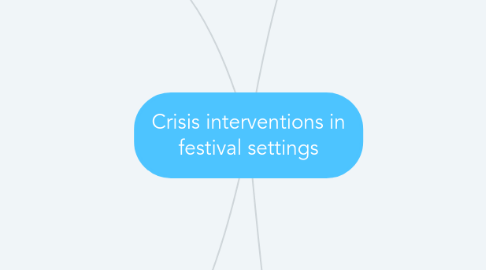
1. 1. Critically evaluate the literature related to crisis interventions.
1.1. limited literature in festival setting
1.1.1. Crisis Intervention Related to the Use of Psychoactive Substances in Recreational Settings - Evaluating the Kosmicare Project at Boom Festival (2015)
1.1.2. My own data from chill welfare and flow
1.1.3. Weekend Societies: Electronic Dance Music Festivals and Event-Cultures
1.1.4. Patnode CD, O'Connor E, Rowland M, Burda BU, Perdue LA, Whitlock EP. (2014), Primary care behavioral interventions to prevent or reduce illicit drug use and nonmedical pharmaceutical use in children and adolescents: a systematic evidence review for the U.S. Preventive Services Task Force. Ann Intern Med. 2014 May 6;160(9):612-20
1.1.5. Jones L, Atkinson AM, Hughes K et al (2010) Reducing harm in drinking environments. A systematic review of effective approaches
1.1.6. Bolier L, Voorham L, Monshouwer K et al. (2011) Alcohol and drug prevention in nightlife settings: A review of experimental studies
1.1.7. The Manual of Psychedelic Support Multidisciplinary Association for Psychedelic Studies (MAPS)
1.2. population often not in contact with services
1.3. cross over with substance use issues
1.3.1. comorbidities
1.3.2. drug induced and drug related mental health issues
1.3.3. drug testing as prvention/early intervention- TEDI, the Loop, DIMS, WEDINOS
1.4. general crisis interventions literature
1.4.1. Thompson, N. (2010) Crisis intervention
1.4.2. Kenneth Yeager and Albert Roberts (2015) Crisis Intervention Handbook : Assessment, Treatment, and Research
1.4.3. Rick Myer (2001) Assessment for Crisis Intervention: A Triage Assessment Model
1.4.4. Johnson S, Needle J, Birdman J and Thornicroft G (Eds)(2008) Crisis Resolution and Home Treatment in Mental Health
1.4.5. Forsman A, Nordmyr J, Wahlbeck K (2011) Psychosocial interventions for the promotion of mental health and the prevention of depression among older adults
1.4.6. King R, Lloyd C, Meehan T, Deane F, Kavanagh D (Eds) (2013) Manual of Psychosocial Rehabilitation
1.4.7. Golightley M and Goemans R (2017) Social Work and Mental Health
1.4.8. Bogg D (2010) Values and Ethics in Mental Health Practice
1.4.9. Brooker C and Repper J (2008) Mental Health: From Policy to Practice
2. 2. Critically evaluate the approach and interventions used in a mental health crisis situation seen in your practice.
2.1. Roberts Seven Stage Crisis Intervention Model
2.1.1. Stage I: Psychosocial and Lethality Assessment
2.1.2. Stage II: Rapidly Establish Rapport
2.1.3. Stage III: Identify the Major Problems or Crisis Precipitants
2.1.4. Stage IV: Deal With Feelings and Emotions
2.1.5. Stage V: Generate and Explore Alternatives
2.1.6. Stage VI: Implement an Action Plan
2.1.7. Stage VII: Follow-Up
2.2. Myer’s (2001) triage assessment model
2.3. ASIST
2.4. MHFA
2.4.1. ALGEE
2.5. Solution Focused
2.5.1. O’Connell B (2012) Solution Focused Therapy
2.6. Motivational Interviewing
2.6.1. Miller and Rollnick
2.7. Barriers
2.7.1. Challenges of festival environment e.g. no place of safety, police/medical response
2.7.2. Challenges for young adult mental health transition from CAMHS to adult services (different in different areas)
2.7.3. Often involves substance use
2.8. Opportunities
2.8.1. early intervention
2.8.2. often no previous contact with services
2.8.3. Level of provision often greater than in community
2.8.4. Immediate care possible
3. 3. Critically examine government (incl. NHS) policies and relate your findings to an ethical model.
3.1. Distress brief interventions
3.1.1. Evaluability assessment of the Distress Brief Intervention programme in Scotland (2017)
3.2. Future in mind
3.3. 5 year forward view
3.4. Mental Health Act
3.5. Children's Act
3.6. Safeguarding/adults with incapacity
3.7. Link to Roberts and Myers model
3.8. NICE guidelines
3.8.1. NICE Depression in children and young people: identification and management NICE guideline [NG134] (2019)
3.8.2. NICE (2014) PSYCHOSIS and Schizophrenia in adults
3.8.3. NICE (2011) PSYCHOSIS WITH COEXISTING SUBSTANCE MISUSE ASSESSMENT AND MANAGEMENT IN ADULTS AND YOUNG PEOPLE
4. 4. Justify the need to incorporate crisis interventions in practice.
4.1. suicide prevention
4.1.1. 10 ways to improve safety’
4.1.1.1. NATIONAL CONFIDENTIAL INQUIRY into Suicide and Safety in Mental Health Annual Report 2018
4.2. Early intervention is psychosis
4.2.1. Smith M, Coleman R and Grant J (Eds) (2001) Psychiatric First aid in Psychosis
4.2.2. EI/ CAMHS
4.2.3. Max Birchwood
4.2.4. NICE (2016) Implementing the Early Intervention in Psychosis Access and Waiting Time Standard: Guidance
4.3. Immediate safeguarding
4.3.1. Adults with incapacity
4.3.2. Mental Health Act
4.3.3. Children's Act
4.4. Early intervention/prevention
4.4.1. Mental Health of Children and Young People in England, 2017
4.4.2. No health without mental health
4.5. Trauma informed
4.5.1. ACEs
